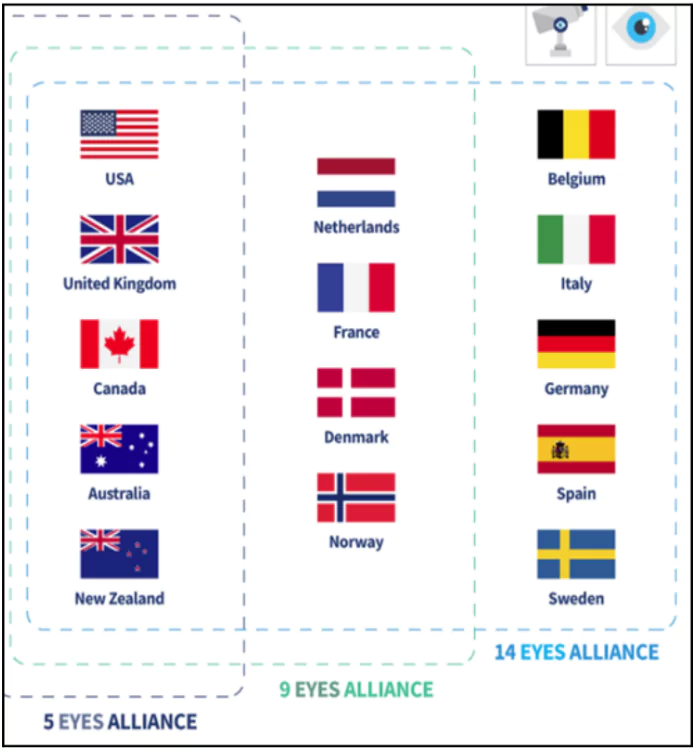The UK becomes the third member of the Five Eyes alliance, after New Zealand and Australia, to back Canada’s stance in the ongoing diplomatic dispute between India and Canada.
- The UK and other Five Eyes countries have called on India to cooperate with Canada’s legal proceedings regarding the killing of Nijjar, citing respect for sovereignty and due legal processes as essential.
About 5 eye Countries
- The ‘Five Eyes’ is a multilateral intelligence-sharing network shared by over 20 different agencies of its five English speaking members.
 Nomenclature: Intelligence documents shared between the member countries are classified ‘Secret—AUS/CAN/NZ/UK/US Eyes Only,’ which gave the group its title ‘Five Eyes.
Nomenclature: Intelligence documents shared between the member countries are classified ‘Secret—AUS/CAN/NZ/UK/US Eyes Only,’ which gave the group its title ‘Five Eyes.- Five Eye countries : Australia, Canada, New Zealand, U.S., and U.K. They coordinate closely on issues of common security interest.
- Formation: During the Second World War UK and US decided to share intelligence after successfully breaking German and Japanese codes, respectively.
- This led to the UKUSA (UK-USA) formation which was signed in 1946.
- Canada joined it in 1949
- New Zealand and Australia did so in 1956
- Partner nations: They exchange a wide spectrum of intelligence within one of the world’s most tightly-knit multilateral agreements as part of the collaboration.
- The alliance is both surveillance-based and tracks signals intelligence (SIGINT)
- Expansion: Agency later enlarged its core group to “Nine Eyes” Group to cover the Netherlands, Denmark, France and Norway.
- Further Expansion : It led to formation of 14 Eyes Bloc which includes Belgium, Italy, Germany, Spain and Sweden
Check Out UPSC Modules From PW Store
Role of 5 eye in current India-Canada Issue
- Close ties with India: The U.S., U.K., and Australia are seen as close allies of India, which is also home to significant Indian and Indian-origin populations, similar to Canada.
- Pro-Khalistan activities: These countries have also experienced some instances of pro-Khalistan movements in recent years enabling them to understand India’s Concern.
- Potential mediators: Given their strong ties to both countries, particularly the U.S., these nations could potentially act as mediators in the issue, once they gather clear intelligence and information on the matter.
![]() 17 Oct 2024
17 Oct 2024
 Nomenclature: Intelligence documents shared between the member countries are classified ‘Secret—AUS/CAN/NZ/UK/US Eyes Only,’ which gave the group its title ‘Five Eyes.
Nomenclature: Intelligence documents shared between the member countries are classified ‘Secret—AUS/CAN/NZ/UK/US Eyes Only,’ which gave the group its title ‘Five Eyes.